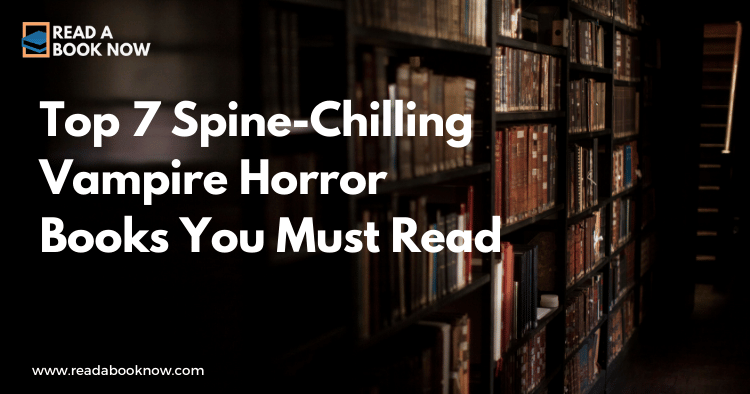Table of Contents
- Introduction
- 1. “Dracula” by Bram Stoker
- 2. “Interview with the Vampire” by Anne Rice
- 3. “The Historian” by Elizabeth Kostova
- 4. “Let the Right One In” by John Ajvide Lindqvist
- 5. “The Southern Book Club’s Guide to Slaying Vampires” by Grady Hendrix
- 6. “The Coldest Girl in Coldtown” by Holly Black
- 7. “Fevre Dream” by George R.R. Martin
- Conclusion
- FAQs
Introduction
Vampires have haunted the pages of literature for centuries, captivating us with their dark allure and terrifying presence. From classic tales that laid the groundwork for the genre to modern interpretations that add fresh twists, vampire horror books continue to send shivers down our spines. If you’re on the hunt for tales that will keep you up at night (and not just because you’re worried about your neck), look no further! Here are seven spine-chilling vampire horror books you absolutely must read.
1. Dracula by Bram Stoker
Published in 1897, Dracula is the quintessential vampire novel that set the standard for countless adaptations and interpretations. The story unfolds through a series of letters, diary entries, and newspaper articles, offering a unique narrative style that immerses readers in the chilling world of Count Dracula.
Stoker’s vampire embodies the fears and anxieties of the Victorian era, including issues of sexuality, immigration, and the clash of modernity against ancient superstition.
Why You Should Read It:
Dracula offers a rich tapestry of themes and a strong sense of place, making it a seminal work in horror literature. Embrace the suspense as you follow Jonathan Harker and Mina Murray’s harrowing encounters with the enigmatic Count.
2. Interview with the Vampire by Anne Rice
Anne Rice’s Interview with the Vampire (1976) revitalized the vampire genre, introducing a more sympathetic portrayal of these creatures. This novel chronicles the life of Louis de Pointe du Lac as he recounts his transformation into a vampire by the charismatic yet morally ambiguous Lestat.
The book explores themes of immortality, despair, and the search for meaning in a world devoid of it. Rice’s lush prose and deep character exploration make this a compelling read.
Why You Should Read It:
The interplay between Louis and Lestat raises questions about morality and the human condition. If you’re interested in a vampire story that delves into existential themes, this book is a must-read.
3. The Historian by Elizabeth Kostova
The Historian (2005) weaves a complex narrative that spans centuries, intertwining history with the myth of Dracula. The novel follows an unnamed woman as she delves into her father’s obsession with the historical Dracula, exploring the dark legacy of the vampire through her research.
Kostova’s blend of historical fiction and horror creates a captivating atmosphere, as she expertly balances the quest for knowledge with the terror of what lies in the shadows.
Why You Should Read It:
This novel is perfect for readers who enjoy intricate plots and rich historical detail. The way Kostova intertwines different timelines keeps you on the edge of your seat.
4. Let the Right One In by John Ajvide Lindqvist
In Let the Right One In (2004), a haunting tale unfolds in the cold, bleak suburbs of Sweden. The story follows Oskar, a bullied young boy who befriends Eli, a mysterious girl who turns out to be a vampire. This novel goes beyond the typical vampire tropes, exploring themes of loneliness, friendship, and the complexities of growing up.
Lindqvist’s writing is both disturbing and poetic, creating an atmosphere that is as chilling as it is beautiful.
Why You Should Read It:
This book is a unique blend of horror and coming-of-age story, making it resonate with a wide audience. Its exploration of the human psyche through the lens of horror is both captivating and unsettling.
5. The Southern Book Club’s Guide to Slaying Vampires by Grady Hendrix
In this 2020 novel, Grady Hendrix combines humor and horror in a tale about a book club of Southern women who discover that their charming new neighbor is a vampire. Set in the 1990s, the book tackles issues of gender and societal expectations, all while delivering a thrilling narrative.
Hendrix’s witty writing and engaging characters make this a delightful yet chilling read.
Why You Should Read It:
If you enjoy a mix of humor and horror, this book will keep you entertained. It’s a fresh take on the vampire genre that also offers social commentary, making it both fun and thought-provoking.
6. The Coldest Girl in Coldtown by Holly Black
Holly Black’s The Coldest Girl in Coldtown (2013) presents a unique dystopian world where vampires and humans coexist in a dangerous, quarantined area known as Coldtown. The story follows Tana, who wakes up after a party to find herself in a deadly situation.
Black’s novel is rich with suspense and explores themes of identity, desire, and the consequences of a vampire-infested society.
Why You Should Read It:
This novel is an innovative take on vampire lore, blending elements of horror with a contemporary twist. If you enjoy fast-paced stories with strong female leads, this is the book for you.
7. Fevre Dream by George R.R. Martin
Set in the 1850s, Fevre Dream (1982) is a tale about a steamboat captain who becomes embroiled in a battle against a powerful vampire. George R.R. Martin’s masterful storytelling creates a vivid backdrop of the Mississippi River and a rich exploration of power, ambition, and morality.
The characters are deeply developed, and the atmosphere is thick with tension, making it a gripping read.
Why You Should Read It:
If you’re a fan of Martin’s Game of Thrones, you’ll appreciate his intricate plotting and character development in this earlier work. It’s a unique blend of historical fiction and horror that will keep you riveted.
Conclusion
Vampire horror literature offers a diverse array of tales that explore our deepest fears and desires. Whether you prefer classic Gothic horror or contemporary narratives with fresh takes, the books on this list promise to enthrall and terrify. So grab a cozy blanket, dim the lights, and prepare to be captivated by these spine-chilling vampire stories.
FAQs
1. What makes vampire horror different from other horror genres?
Vampire horror often explores themes of immortality, seduction, and the duality of human nature, distinguishing it from other horror genres that may focus more on monsters or psychological terror.
2. Who are some of the most famous vampire authors?
Bram Stoker, Anne Rice, Stephen King, and Holly Black are among the most notable authors known for their contributions to vampire literature.
3. Are there any vampire horror books suitable for young adults?
Yes! Books like The Coldest Girl in Coldtown and Let the Right One In can appeal to young adult readers, balancing horror elements with relatable themes.
4. How have vampires evolved in literature over time?
Vampires have transitioned from monstrous figures representing societal fears to complex characters that embody themes of love, loss, and existential dread.
For more information, also look for related themes in classic literature, such as the exploration of human nature in works like 10 Timeless British Classics Everyone Should Read and 10 Essential Modern Classics You Must Read Today.
With this guide, you’re now equipped to dive into the chilling worlds of these vampire horror books. Happy reading, and don’t forget to keep a light on!




